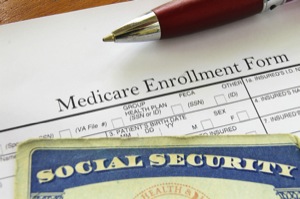
Despite the current respite from the government shutdown and near default, we aren’t really much closer to a real budget deal. House Republicans want to keep discretionary spending at the slashed levels of the sequester and decrease the deficit through cuts to entitlements like Medicare and Social Security. President Obama wants to ease the sequester cuts, but will likely only entertain entitlement cuts if there are new tax revenues, something House Republicans say they won’t do.
One of the few places of overlap is “means-testing” Medicare. In short, it means that richer or higher income Americans will get fewer benefits. It’s a cut to entitlements, which conservatives like, but the costs don’t fall on poor Americans, which may make it palatable to President Obama.
If it sounds too good to be true, it is. While the numbers make means-testing look like a way to extend the life of Medicare, it is in truth a slow poison meant to bring an end to the program. Not by continued reduction in payments, but by creating a broader constituency against it.
Conservatives who would cut, end or privatize Medicare currently have a problem: enrollees, including conservative voters, like it. Every time it has been threatened, the AARP and other political groups have reminded politicians that seniors vote, and they vote against Medicare cuts. Even during the anti-Obamacare town halls of 2010, Tea Party seniors could be seen with signs demanding “Keep government out of my Medicare.”
There are many reasons for the success of Medicare, and means testing threatens at least two of them. First, participants are generally treated equally. If you are 65, or meet one of the other requirements (such as dialysis), you get the benefits. Second, it’s fairly simple and unobtrusive, because if you meet the requirements, you get the benefits.
Means testing would likely require giving the government more personal and financial information when applying for Medicare, making it seem more like “big brother” running your health care than simply accessing a benefit you already paid for. Then, based on the information, some people will get fewer benefits despite having paid in as much or more than others. In the script by House Budget Committee Chairman Rep. Paul Ryan, wealthy seniors and wealthy seniors-to-be, despondent that they are getting fewer benefits, will join forces with advocates of smaller government to unravel or privatize Medicare.
If that sounds familiar, it’s because we see the same dynamic playing out with Obamacare. Part of the problem with the healthcare.gov Web site appears to be gathering the quantity and variety of data needed for the various state exchanges. Those who make it through all that may be disappointed in what they will pay, even if it is for better insurance than they had (assuming they had any at all). Rather than associating the lack of subsidy or fee with any dislike of taxes in general, they join the Tea Party in objection to Obamacare.
As it stands, Medicare is one of the most efficient health care systems with regard to costs and overhead, while being well liked by its enrollees. If our limited experience with the Affordable Care Act says anything, it is that Obamacare should be more like Medicare, not the other way around. Medicare should remain something every American can depend on, not the class warfare weapon that would result from “means-testing.”
















Medicare is already highly means tested. Please learn about Medicare before you write about it because you run the risk of seriously misinforming senior citizens
– Those under a certain income threshold (may or may not include an asset threshold also depending on state) do not pay for Medicare at all
— Those over a slightly higher threshold pay for Medicare Part B but nor for drugs except for nominal co-pays
— Those over a slightly higher threshold get a very large discount on their drug costs
— Those over a certain amount pay between a 50% to a 200% surtax for their Part B
— Those over a certain amount pay between a 50% to a 200% surtax for their Part D
— Those still working pay 3% of their income in Medicare payroll taxes no matter how much they earn (unlike with Social Security which knocks off at around $113,000)
— Those over a very high threshold pay even higher than 3%
Almost everything else you said about Medicare is also wrong. In particular, if it is so popular why do 110% of us seniors on medicare also get some kind of supplemental insurance?
thanks for this awesome blog! who do you think is the most trusted guitar shop in the area?